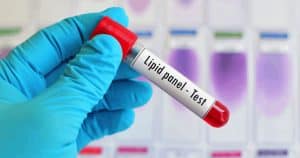
A blood lipid panel will assess your risk of developing cardiovascular disease and can help monitor your current treatment plan if you are already diagnosed. If you do not have any risk factors for heart disease or diabetes, a blood test performed every 4 to 6 years may be sufficient. Yearly or more frequent blood tests may be required when risk factors are present or a current treatment plan is in place. A lipid panel will generally assess your total cholesterol, high-density lipoprotein cholesterol (HDL), low-density lipoprotein cholesterol (LDL) and triglycerides. A blood glucose test may also be helpful to assess your risk of developing diabetes. Talk to your doctor if you are unsure of where you fall or if these tests may be beneficial.
Let’s explore some of the key takeaways from your lipid panel blood test.
What is Cholesterol?
Cholesterol is a waxy substance produced primarily by the liver and is found in all cells of the body. The cholesterol in food is referred to as ‘dietary cholesterol’ and is found only in animal products. Sources of dietary cholesterol include fat from beef, chicken, and pork, cream and milk, dairy products, egg yolks, and shellfish.
What Does Cholesterol Do?
Cholesterol is found in all cells as a structural component of cell membranes. It is also necessary for the production of bile, which aids in the digestion of fat in the intestines. Vitamin D and hormones such as estrogen and testosterone also require the presence of cholesterol.
HDL vs. LDL Cholesterol
Cholesterol is transported through the blood by particles that contain fat and protein. There are several types of these particles and how much you have of each one is a contributing factor to your risk of cardiovascular disease.
- High-Density Lipoprotein (HDL) Cholesterol – Also referred to as ‘good’ cholesterol, this form takes cholesterol from the body tissues back to the liver, where it can be broken down and removed. Higher levels of HDL cholesterol in the blood may help prevent buildup in the blood vessels and may therefore decrease your risk of developing cardiovascular disease.
- Low-Density Lipoprotein (LDL) Cholesterol – Also referred to as ‘bad’ cholesterol, this form takes cholesterol from the liver to the arteries and body tissues. Higher levels of LDL cholesterol in the blood may lead to a buildup in the blood vessels and may therefore increase your risk of developing cardiovascular disease.
What are Triglycerides?
Triglycerides are a type of fat found in your blood. When you eat, your body converts any calories it doesn’t need right away into triglycerides, which are then stored in your fat cells. Between meals, hormones will release triglycerides, as necessary, for energy. If you consistently consume more calories than you burn, especially in the form of highly-processed, carbohydrate-rich foods, you may be at risk of an increased level of triglycerides.
Why do Triglyceride Levels Matter?
High triglyceride levels may increase your risk of stroke, heart attack, and heart disease as it can contribute to the hardening of your arteries or the thickening of artery walls. Extremely elevated triglyceride levels may also cause inflammation of the pancreas. Other conditions that may be associated with high triglycerides are: type 2 diabetes and prediabetes, metabolic syndrome, and hypothyroidism.
Triglycerides vs. Cholesterol
Triglycerides and cholesterol are both types of fat that circulate through your blood stream. Where they differ are in their respective jobs within the body. Triglycerides store unused calories and provide the body with energy between meals while cholesterol is used to make hormones and is a structural component of cell membranes.
What is Blood Sugar?
Eating and digesting foods higher in carbohydrates forms glucose, also known as blood sugar. There is a test that can be performed to measure blood sugar levels. This is an important number to know as consistently elevated levels are associated with diabetes and insulin resistance.
What Does Glucose Do?
Your body uses glucose as its main energy source to fuel all bodily functions. Insulin is used by the body to allow glucose to go into the cells and be used as energy. Without insulin, glucose levels in the blood would continually rise, wreaking havoc on the body. Our pancreas produces insulin to assist in this process. Diabetes is a disease where the pancreas makes inefficient insulin or cannot make insulin at all, resulting in continually elevated blood sugar levels.
What Do I Do?
Eating a healthy, well-balanced diet full of veggies, fruit, whole grains, legumes, and lean protein will be beneficial for everyone. If there are certain items your doctor would like you to improve, however, check out the chart below and learn where to concentrate your efforts!
| Goal: | Interventions: |
| Decrease Cholesterol |
|
| Increase HDL (good cholesterol) |
|
| Decrease LDL (bad cholesterol) |
|
| Decrease Triglycerides |
|
| Decrease Fasting Blood Sugar |
|
A blood lipid panel will be conducted for all participants that join our HealthyCare 90-Day Wellness Program to give our nutritional professionals an understanding of what needs to change in your diet to achieve better overall health.
Curious about blood lipid panels, HealthyCare, or other nutrition services offered at Elite Sports Clubs? Schedule a FREE, no-obligation nutrition consultation with me!
Schedule a Nutrition ConsultationWritten by Sarah Brunner, RDN, CD; Elite Sports Clubs Registered Dietitian
Sarah is certified in food allergies/intolerances and nutritional counseling, Academy of Nutrition and Dietetics; has a certificate in Dietetics from Mount Mary University; and a BA in Education and Mathematics from the University of Wisconsin – La Crosse.
